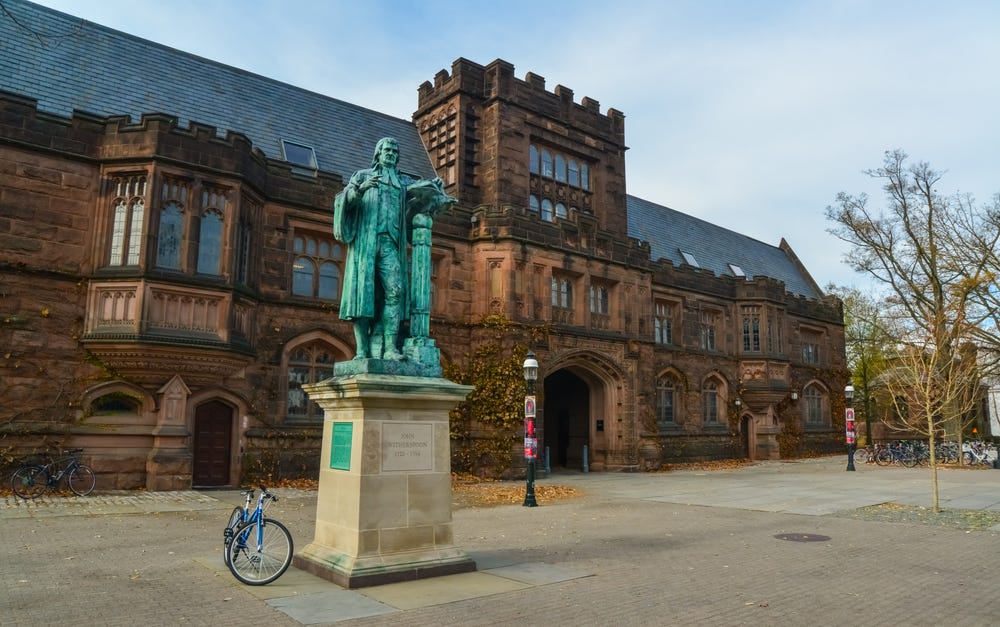E-Pluribus | January 10, 2023
Coming for statues again, cleansing the language, and worshipping anti-racism.
A round-up of the latest and best writing and musings on the rise of illiberalism in the public discourse:
George F. Will: Wokeness in All Its Self-Flattering Moral Vanity Comes for A Statue at Princeton
Though statues have been spared the spotlight lately, George Will in The Washington Post takes aim at Princeton for considering the removal of a statue of former Princeton president John Witherspoon. Though Princeton is up front about Witherspoon’s history regarding slavery, Will says this desire to purge says more about those seeking the statue’s removal than it does about Witherspoon.
Since 2001, a statue of John Witherspoon (1723-1794), the Presbyterian minister recruited from Scotland to be the then-college’s president, has adorned a plaza adjacent to Firestone Library. Now the woke, who subordinate everything to “social justice” as they imagine it, demand its removal because he owned two slaves and did not advocate immediate abolition.
[ . . . ]
Today’s disparagement of Witherspoon is more than just another example of “presentism” — judging the past through the lens of the present. It illustrates how the woke become a suffocating, controlling minority.
Princeton’s Committee on Naming has been holding “listening sessions” to ascertain what Princetonians think about the statue. But who is speaking? Princetonians for Free Speech (PFS), an alumni organization much more devoted than the university’s administration and trustees are to viewpoint diversity, notes that “the atmosphere on campus greatly inhibits students, faculty, and others from stating their true views” on “highly politicized issues,” which nowadays most issues become.
[. . .]
PFS notes that the anti-Witherspoon cohort says Princeton is a “home,” therefore everyone should be protected from feeling “less at home” because of, say, unhappy thoughts occasioned by a statue. But a university is not a “home.” A university’s raison d’être, unlike a family’s, is civil but robust and unsettling questionings and disagreements. (Although a family without controversies sounds unlikely and unappealing.)
Read it all here.
Andrew Doyle: A Puritanical Assault on the English Language
Pluribus recognizes the importance of language in clearly communicating and debating contentious issues. At Quillette, Andrew Doyle says the drive of some to weaponize words with loaded meanings is simply a tool to silence one’s opponents rather than engage on the battlefield of ideas.
It is inevitable that the principle of freedom of speech should become a casualty when powerful people are obsessed with language and its capacity to shape the world. Revolutionaries of the postmodernist mindset would have us believe that societal change can be actuated through modifications to the language that describes it, which is why Max Horkheimer of the Frankfurt School maintained that it was not possible to conceive of the liberated world in the language of the existing world. As for the new puritans, they have embraced the belief that language is either a tool of oppression or a means to resist it. This not only accounts for their approval of censorship and “hate speech” legislation, but their inability to grasp how the artistic representation of morally objectionable ideas is not the same as an endorsement.
[ . . . ]
[W]hy is it that so many journalists and activists are persuaded that neo-Nazism has gone mainstream? Why do so many on social media feel the need to identify themselves as “anti-fascist”? Like most people, I have never met an actual fascist. I have encountered some racists, a few far-right advocates, and one white nationalist during the filming of a programme for the BBC—but no fascists, so far as I am aware. My default expectation of my fellow creatures is that they would instinctively oppose such pernicious ideas. Claiming to be an “anti-fascist” is rather like wearing a badge saying “I am not a paedophile”; it makes others wonder what you’re hiding.
The illusion of a crypto-fascist epidemic is buoyed by the misapprehension that white supremacists and neo-Nazis tend to keep their views to themselves. This is untrue; one of the problems we face in combating these ideologies is that fealty to the cause is considered a source of pride. By failing to use terms accurately and with care, commentators and journalists have created the impression that such groups are pervasive and have thereby inadvertently promoted them. It is no great leap to suppose that this goes some way to explaining why the far Right has lately been recruiting members with greater ease. Although still extremely marginal, there is evidence to suggest that the far Right is growing, and while we ought to take this very seriously, we should not allow the truth to be distorted through lazy hyperbole.
Read it all.
Glenn Loury: The False God of "Antiracism"
At his Substack, Glenn Loury has posted video and a transcript of a conversation he had in 2022 with City University of New York political scientist Michael Fortner at Claremont McKenna College’s Marion Miner Cook Athenaeum speaker series. Fortner and Loury covered a range of topics, among them how capitalism is viewed today and by blacks in particular.
We have the young generation is much more critical of capitalism. There’s a constant critique of neoliberalism, free market ideas, and so the question for you is that what you just said, I think, presupposes that capitalism could work for black folk. Do you believe that there’s space in capitalism in America for black progress?
Oh, yes. I mean this with great respect, my brother: I think your question is absurd. Compared to what? I mean, has anybody been paying attention to what’s happened in world economic history in the last 75 years? I mean, capitalism as compared to what? What are you going to do, seize the means of production and socialize the economy? Capitalism is the foundation of our prosperity.
I am not talking about an unregulated, Wild West cowboy capitalism where anything goes and we shut down the Federal Trade Commission or we don’t have a welfare state or we have tax rates of zero. That’s not what I’m talking about. I’m fine with a social safety net, with a welfare state, with a sensible set of structures to try to take care of our fellow citizens and whatnot. But the idea that markets are the enemy? I’m talking about prices. I’m talking about allocating resources based upon people seeing price signals and knowing what the relative returns and costs are to the alternative activities that they can pursue. The idea that profit is the enemy. The idea that corporations are bad, that our greatest enemy is the greed of corporations—this is sophomoric rhetoric, in my opinion, and it is not to be taken seriously.
Read the whole thing.
Around Twitter
A few thoughts from David French on persuasion:
Here’s Free Black Thought, the Foundation Against Intolerance & Racism, and former NFL player and coach Tony Dungy commenting on that Scientific American article on football and violence against black men:
And finally, Richard Dawkins provides a foolproof way to identify hate speech:











